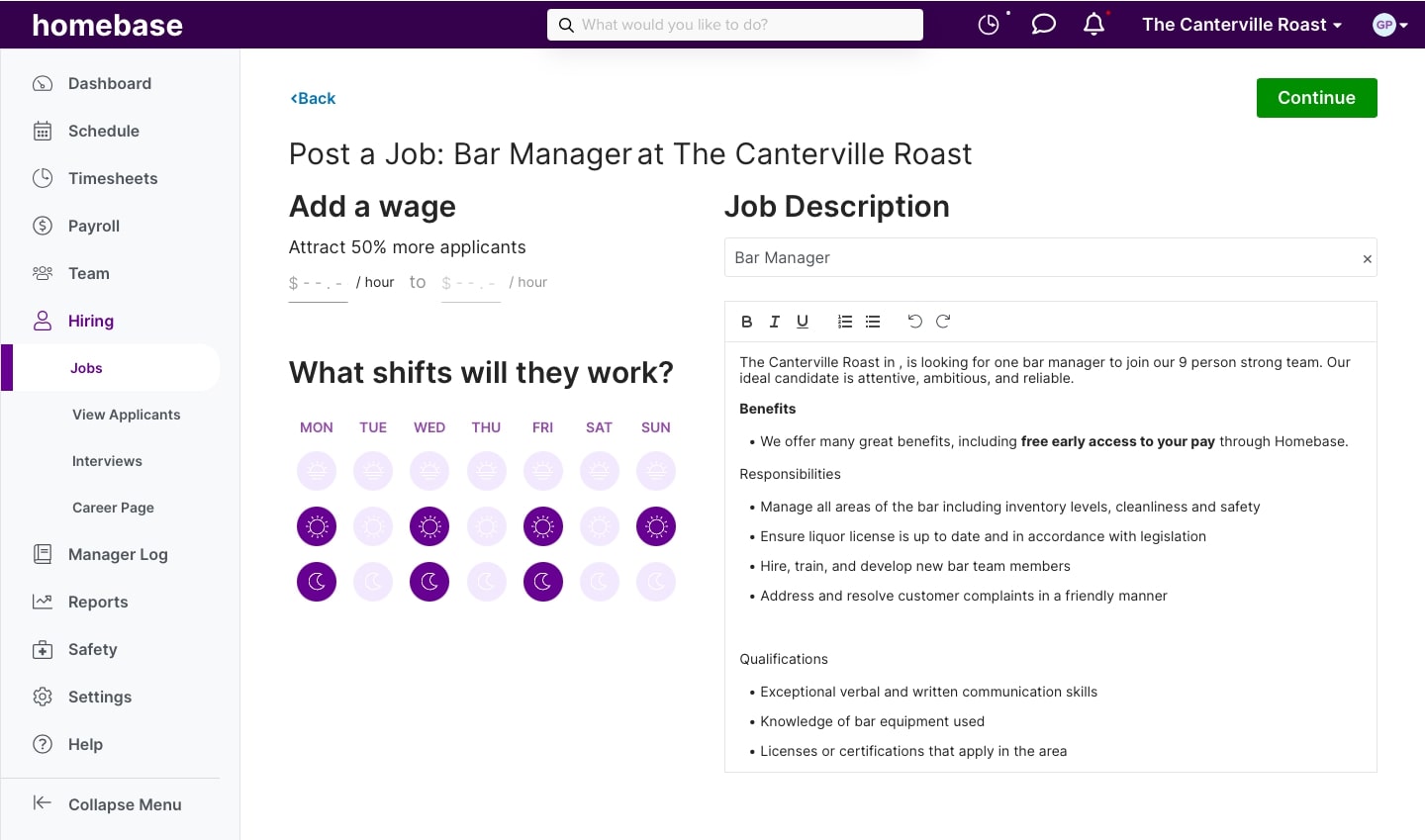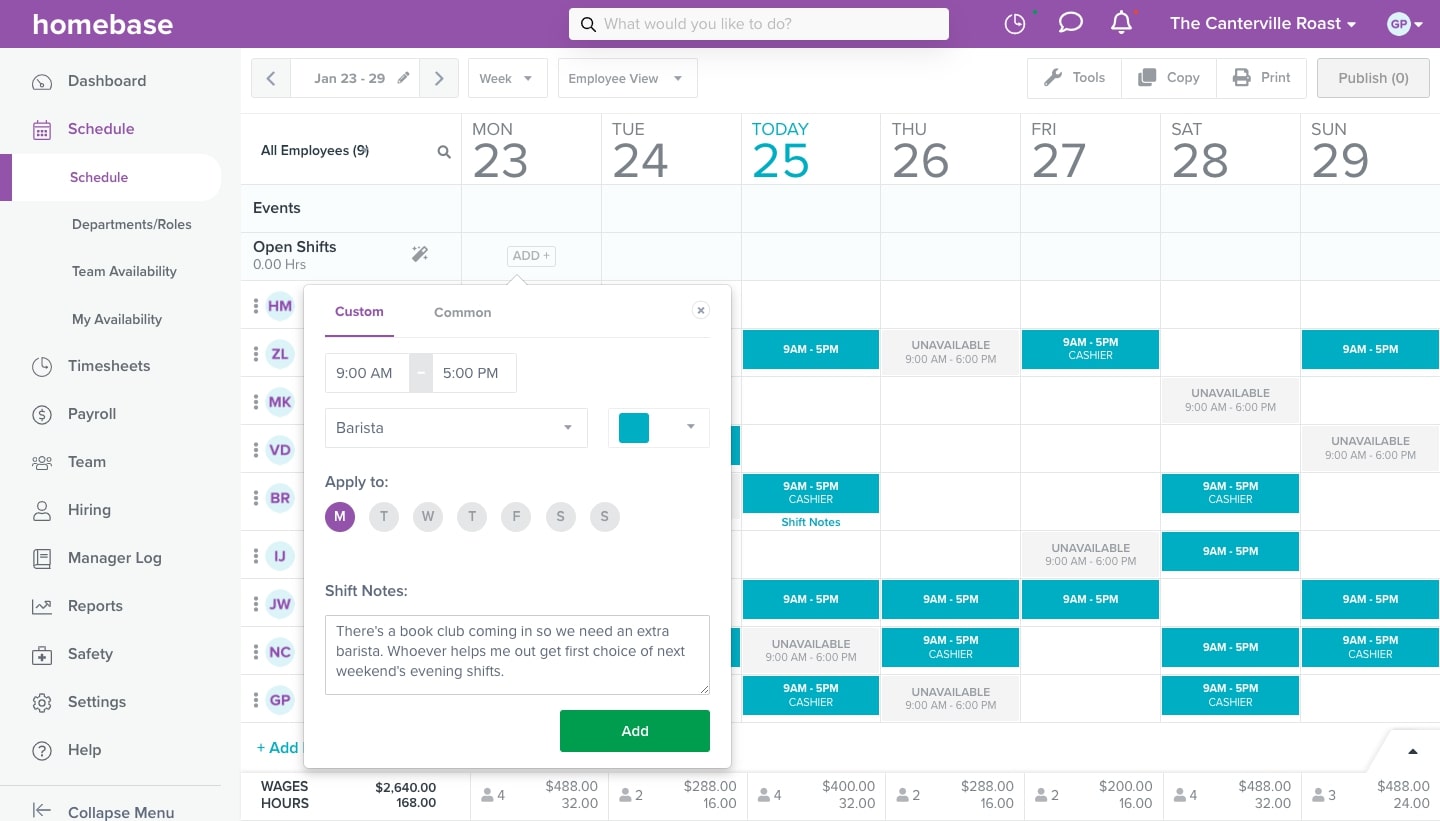Holding onto great employees is challenging in the retail industry. Shops tend to attract younger workers who aren’t in it for the long haul. But even those who want careers in retail can lose interest after years of low pay, repetitive work, and intense fluctuations in workload.
No wonder the retail industry experiences 60% turnover annually.[McKinsey, 2022] That means you may be replacing over half of your team each year.
There’s no reason why you can’t enjoy high retention rates if you can overcome these issues. That also means you can also benefit from lower turnover and lost productivity costs from constantly rehiring new team members.
Let’s explore the best ways to improve retention at your retail store and be sure that the only thing you’re shifting is stock.
1. Look for the best-fitting candidates
Hiring for fit means taking a comprehensive look at applicants. Someone might have years of experience, glowing references, and a genuine enthusiasm for your product. However, they’re still unlikely to stick around if they can’t work the shifts you need or get along with your existing team.
But when you’ve got hundreds of resumes, seeing whether candidates tick every box is easier said than done.
You can narrow down your search by stating the following very clearly in your job ad:
- Job title and department
- Responsibilities
- Required experience and qualifications
- Expected working hours and days
- Location
- Pay and benefits
- Your business values
That way you’ll refine your hiring pool as candidates may find your quirky tea shop appealing but realize they’re not available for all the shifts.
Homebase’s hiring feature can help you get started with our template library for dozens of popular, small business roles. Once you’ve added your details and tweaked the text to your satisfaction, we list your ad across hundreds of job sites. Then you can be sure the right eyes will see the open position and apply.

2. Hire a blend of employees
When you’re near a school or college, you have a ready supply of workers. But while students make excellent employees, they often have other commitments and don’t picture themselves in retail forever. This makes them more likely to quit than other staff.
Equally, long-term retail workers may become frustrated with the seasonal nature of the business. If they’re constantly under or overworked, they may look for more secure jobs elsewhere.
The answer is to hire a mix of different ages, backgrounds, and personalities. So, while you have a small, loyal crew all year round on regular schedules, you can increase part-timers’ hours during busy periods. You’ll also reduce the risk of a mass resignation when all your student employees have exams or breaks at once.
3. Offer competitive pay
Pay is one of the top reasons why retail workers are considering leaving their jobs, according to a recent McKinsey survey. The respondents said they had ‘noncompetitive salaries’ and ‘inadequate benefits’ and they were ‘underpaid for their qualifications’.
As the tough economy continues, you may not feel like you’re in a position to offer pay raises and benefits. But paying a higher salary than competitors allows you to save more money on hiring and onboarding new retail workers and then training them.
The current average rate for retail is $15 per hour but it fluctuates between $13 and $17. If you can offer staff a salary on the higher end of that scale, they’ll be more inclined to stay.
4. Keep schedules fair and consistent
While pay is a major consideration, the biggest reason why retail workers think about leaving their jobs is scheduling. Unpredictable and rigid timetables have 34% of staff heading for the exits. That means you could hold onto a third of your employees just by creating more flexible schedules.
The challenge is assigning shifts that suit your team’s availability, keep you adequately staffed, and allow you to stick to your labor budget. Ideally, you also don’t want to stay up all night figuring this out.
Use Homebase to collect your staff’s availability down to the day and the hour. Then you can use the autopopulation feature to create quick, foolproof schedules based on the roles you need and who’s free during that shift. That means you can respect your employees’ preferences and keep them happy but actually reduce time spent on scheduling.

You can then save these schedules as templates and reuse them to ensure staff have consistent shifts that work for them. All you have to do is click the drop-down menu and select the one you need.
5. Encourage open, friendly communication
Creating consistent schedules is only half the battle though. Retail is a dynamic industry and you never know when you’ll need to find last-minute cover for a busy shift or send a team member to run a stall at a local festival.
You can’t plan for everything but you can make coordination easier with clear, effective communication. Using a beginner-friendly team chat app like Homebase allows you to notify employees about schedule changes and leave instructions for the shift.
Better yet, you can also post open shifts for staff to claim with notes. This increases the likelihood that you’ll find a team member who wants the extra hours rather than dealing with understaffing or having someone reluctantly agree.

Retail employees can also gain more control over their schedules by arranging swaps and covers. All you have to do is see the proposed changes and say whether you approve.
6. Reward and recognize good work
During busy times, retail can feel like a thankless task. Customers come and go too quickly to show their gratitude properly. Some don’t understand the challenges of working in a crowded store and become demanding or fixated on small mistakes.
It’s up to you to compensate for unappreciative customers and recognize your team’s hard work. That could be anything from a simple “go you” for an upsell to a discount or a freebie for smashing sales targets.
Homebase has a range of features to thank employees and keep your team happy. You can offer them early cash out so they have more flexibility over when they get paid. There’s also the option to shout out their achievements and hard work on the dashboard where everyone can see it.
7. Liven up routine and repetitive tasks
A survey discovered 46.5% of retail employees don’t find their jobs meaningful. But given the repetitive nature of serving customers and stacking shelves, perhaps that’s not a surprise.
One simple way to prevent boredom is by rotating tasks. So, if you have one person at the counter, and one person counting inventory, have them swap halfway through the shift. Or make sure they have different roles on back-to-back shifts.
You can also introduce games and competitions to incentivize staff. Let’s say you run a shoe shop and August is busy with parents buying their children new school shoes. You can offer a small bonus for every pair of trainers your staff upsells for gym classes.
8. Make career opportunities clear
32% of retail workers say they’re considering quitting over a lack of career opportunities. They also say there’s a ‘lack of emphasis on knowledge, skills, and ability development’.
That means you have to show employees how they can grow within your business. One surefire way is to promote internally rather than looking at external candidates. You can conduct performance reviews to see who’d be most eligible for upcoming positions.
Another way is to explain how staff can move from one position to another and share success stories. For example, if you recently promoted a shop assistant to a supervisor position, you can announce it via the Homebase app. Your team will see that career advancement is possible and what their next steps should be.
9. Offer training and upskilling opportunities
Career advancement and training often come hand in hand. Retail workers may need to develop their leadership, accounting, and management skills to take a more senior position. You can offer mentoring, and weekly training sessions, or look at online courses on platforms like Alison and edX.
But even your temporary staff may appreciate training. They’ll be more confident in their roles and feel like they’re getting more than a paycheck from working at your business. Say you have a future Nobel Prize winner on your team, they could still benefit from building transferable soft skills like teamwork, time management, and task prioritization.
10. Collect feedback from staff
High turnover has many causes and there’s a possibility it’s not related to your industry. Perhaps you have an employee who’s difficult to work with and drives others away. Or maybe the local bus service has recently stopped dropping off passengers near your store.
With so many reasons out there, the quickest way to find out what’s causing employees to quit is simply to ask.
You can link staff to an anonymous survey via your team chat to collect their honest feedback. With a small team, it’s easier to accidentally uncover a respondent’s identity. So, be sure to write questions that don’t reveal personal details, roles, or working hours.
Stop employees from leaving with Homebase
Running a retail store is complicated by high staff turnover. How can you leave the premises when you’ve got a new hire who’s unfamiliar with the products? And how will loyal customers feel when they see yet another new face behind the till?
That’s not to mention the higher costs involved with constantly rehiring and training employees.
Using some simple strategies, you can hold onto your best employees and make yourself stand out from the competition. You may not be able to stop some team members from moving onto their next venture but you’ll also account for temporary and seasonal workers more effectively.
Homebase can support small businesses with their retention strategies. You can set yourself up for success by using our hiring features to find suitable, long-lasting candidates. Our schedule feature allows you to make timetables that keep you fully staffed while respecting your team’s availability. And when you do need to tweak shifts, the team chat feature makes it easy to make swaps and find cover.
FAQs about retail employee retention
What is the average tenure of an hourly retail employee?
The average tenure of an hourly retail employee is 3.1 years according to the latest report from the Bureau of Labor Statistics (BLS). That’s down from 3.7 years in 2012 and lower than many other industries.
Why is staff turnover higher in retail?
Staff turnover is higher in retail for a variety of related reasons. One problem is that shops have unpredictable busy periods which leave employees overworked one moment and bored the next. This also causes some unpredictability with schedules as managers have to change shifts to suit fluctuating demand.
Another problem is that retail doesn’t require much experience or any qualifications so many people use it to supplement other jobs or fill gaps in their timetable. As they’re not committed to the role, they’re more likely to resign.
How does having a low employee retention rate impact my business?
Low employee retention impacts your business by increasing your costs while lowering your performance and affecting your reputation. You lose money when you have to recruit and train new employees. It’s also likely new hires will sell less than the staff you replaced so you have to factor in lost productivity. While you’re looking for candidates, you may be overstaffed which will affect service and lose you customers.
